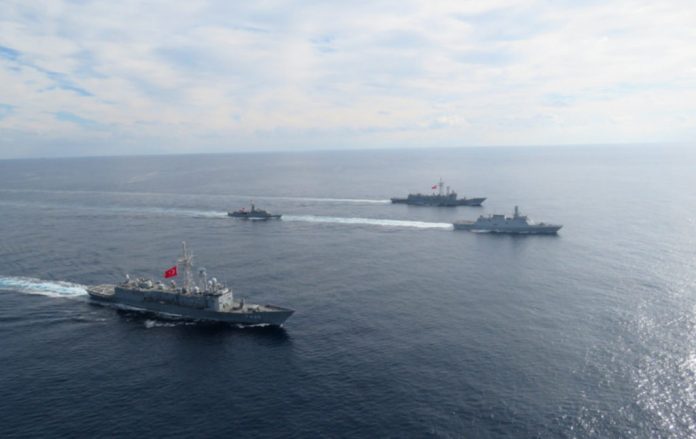After the recent discovery of hydrocarbons in the Eastern Mediterranean by Turkey and the neighboring Greece, tensions began to escalate between the two rivaling countries. While Turkey declared that it would not back down, Greece said the entire hydrocarbon region belongs to it — a claim rejected by Turkish President Recep Tayyip Erdogan.
France and Cyprus have openly stated to back Greece in the conflict; Paris has dispatched its two Rafale fighter jets as a show of solidarity with Greece. Meanwhile, Greece planned of conducting naval exercises with France, Cyprus and Italy. Egypt and the UAE, two distant countries, too have swung into action – the UAE has reportedly sent its F-16s to take part in military drills with the Greek military, and Egypt has finalized with Greece its maritime boundaries, extending the latter’s maritime sphere by 12 nautical miles.
Turkey — apart from conducting military drills near the disputed sites, has responded by sending a seismic survey vessel, escorted by the Turkish warships to conduct surveys in waters also claimed by Athens — the development which has not gone well with France and Greece. The conflict has put NATO in a tight corner while threatening to trigger a massive clash between Turkey and its allies; the gravity of the situation can be gauged from the warning from German foreign minister Heiko Maas, “any small spark could lead to catastrophe” and from President Erdogan‘s resolve of making “no concessions on that which is ours.”
These escalating tensions between the two NATO members are not unfounded: both claim the areas of gas–rich waters in the eastern Mediterranean. Greece claims that each island (numbering in thousands) is its own and it has exclusive drilling rights in the islands. This claim is backed by the European Union which last year sanctioned Turkey for conducting survey off the north Cypriot coast; besides, it has several times warned Ankara against doing further exploration.
In recent months, Turkey and Greece have each looked for strengthening their territorial claims by drawing up exclusive maritime economic zones. But in addition to these territorial claims, the two countries’ tensions revolve around certain historical grievances and nation interest. Chief among them are the conflicted status of Cyprus, the wars in Libya and Syria and the power game in the region. The decreasing influence of the United States in the region is another key factor for the escalating tensions between Ankara and Athens. Both sides are seeking an upper hand in the regional struggle for influence.
However, the status of Cyprus is the main source of the strained relations in the recent years between the two neighbours. Ankara’s invasion, trigged by a Greek backed military coup in the island in 1974 enabled the Turkish forces to control the island’s northern part, pushing Greek Cypriots out of the area. Later in 1983, a Turkish Cypriot politician formed the Turkish Republic of Northern Cyprus (TRNC). Recognized by Turkey, the TRNC joined the EU in 2004. Ever since, tensions between Greece and Turkey have been on the rise, bringing the two countries close to war in 1996 over two uninhabited islets in the Aegean Sea.
The dispute over the unsolved status of Cyprus is on display in the eastern Mediterranean. Ankara‘s position is that if the TRNC is not involved, any deals which Cyprus agrees on energy exploration are illegal: Greece calls it illegal if Turkey carries out gas exploration near Cyprus.
Another major cause of tension between the two countries is the movement of migrants from the Middle East to Europe. Turkey hosts nearly four million migrants and refugees. In February, thousands of asylum seekers crossed over into Greece, leading to a tough response from Athens. The response included using violence against the asylum seekers, human rights groups criticized the move; on the other hand, allowing the refugees to cross over was seen as Turkey’s attempt to use it as a bargaining device.
What escalated the tensions was Ankara’s recent move of re-converting Hagia Sophia, the ancient Christian cathedral turned museum, into a mosque — the move angered not only Greece but also Russia, the center of orthodox Christianity like the former. Hagia Sophia was a museum since 1934 but Erdogan in July this year turned it into a mosque, a move which has given a hard beating to the sanctity of Mustafa Kemal Ataturk, Turkey’s modern founder. Moreover, the move undermined the country’s secularist history. And most recently, Erdogan government announced to reconvert Chora church into a mosque. Greece accuses the Turkish president of advancing a “neo-ottoman” strategy in the Eastern Mediterranean as part of an “attempt to implement expansionist aims against neighbors and allies.”
But while acting to emulate the erstwhile Ottoman Empire, president Erdogan can not sideline the fact that this policy alienates Turkey’s allies and isolates it in the region. No Arab country has backed his recent moves, signaling that they disapprove the Turkish premier’s policies. His pro-Palestine stance (criticizing the Abraham Accord) has not won him Arab countries’ sympathy in the wider region. The adversarial position taken by the UAE against Turkey, as it showed through its dispatch of fighter jets to take part in drills with the Greek military, can be seen as Ankara’s dwindling influence in the region.
War between Greece and Turkey — two NATO members in the Mediterranean would be a disaster; though both sides seek to hold negotiations to deescalate tensions, the point of concern is the continuing brinkmanship threatening of accidental escalation.
The views and opinions expressed in this article are those of the author.

Sheikh Shabir Kulgami is a Kashmiri (Indian) political commentator, analyst and columnist. He writes extensively on South Asia.


